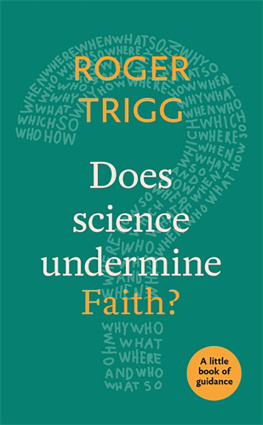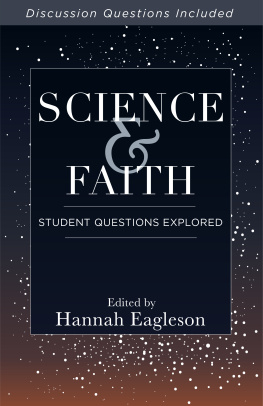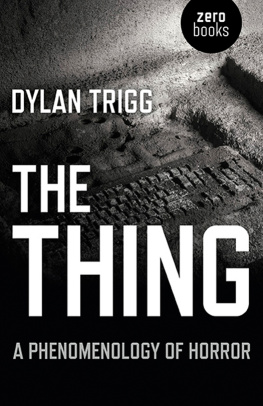Trigg - Does Science Undermine Faith?
Here you can read online Trigg - Does Science Undermine Faith? full text of the book (entire story) in english for free. Download pdf and epub, get meaning, cover and reviews about this ebook. year: 2018, publisher: SPCK, genre: Religion. Description of the work, (preface) as well as reviews are available. Best literature library LitArk.com created for fans of good reading and offers a wide selection of genres:
Romance novel
Science fiction
Adventure
Detective
Science
History
Home and family
Prose
Art
Politics
Computer
Non-fiction
Religion
Business
Children
Humor
Choose a favorite category and find really read worthwhile books. Enjoy immersion in the world of imagination, feel the emotions of the characters or learn something new for yourself, make an fascinating discovery.
Does Science Undermine Faith?: summary, description and annotation
We offer to read an annotation, description, summary or preface (depends on what the author of the book "Does Science Undermine Faith?" wrote himself). If you haven't found the necessary information about the book — write in the comments, we will try to find it.
Trigg: author's other books
Who wrote Does Science Undermine Faith?? Find out the surname, the name of the author of the book and a list of all author's works by series.
Does Science Undermine Faith? — read online for free the complete book (whole text) full work
Below is the text of the book, divided by pages. System saving the place of the last page read, allows you to conveniently read the book "Does Science Undermine Faith?" online for free, without having to search again every time where you left off. Put a bookmark, and you can go to the page where you finished reading at any time.
Font size:
Interval:
Bookmark:
Roger Trigg is Emeritus Professor of Philosophy at the University of Warwick, and Senior Research Fellow at the Ian Ramsey Centre, University of Oxford. The author of many books on philosophy, his latest is Beyond Matter: Why Science Needs Metaphysics .
Little Books of Guidance
Finding answers to lifes big questions!
Also in the series:
How Can I Believe? by John Cottingham
How Do I Pray? by John Pritchard
What Do We Mean by God? by Keith Ward
What Is Christianity? by Rowan Williams
Where on Earth Is Heaven? by Paula Gooder
Who Was Jesus? by James D. G. Dunn
Why Are We Here? by Alister McGrath
Why Be Good? by Robin Gill
Why Believe in Jesus Resurrection? by James D. G. Dunn
Why Did Jesus Have to Die? by Jane Williams
Why Does God Allow Suffering? by Robin Gill
Why Go to Church? by John Pritchard
Why Read the Bible? by Tom Wright
First published in Great Britain in 2018
Society for Promoting Christian Knowledge
36 Causton Street
London SW1P 4ST
www.spck.org.uk
Copyright Roger Trigg 2018
All rights reserved. No part of this book may be reproduced or transmitted in any form or by any means, electronic or mechanical, including photocopying, recording, or by any information storage and retrieval system, without permission in writing from the publisher.
SPCK does not necessarily endorse the individual views contained in its publications.
British Library Cataloguing-in-Publication Data
A catalogue record for this book is available from the British Library
ISBN 9780281078684
eBook ISBN 9780281078691
Typeset by Manila Typesetting Company
First printed in Great Britain by Ashford Colour Press
Subsequently digitally reprinted in Great Britain
eBook by Manila Typesetting Company
Produced on paper from sustainable forests
Does science disprove God?
In the contemporary world, reason is often thought to be the preserve of scientists. They sometimes seem to claim a monopoly on establishing what is true, or even credible. This view has a major influence on public life, and it is all too easy for non-scientific ideas, such as a belief in God, to be dismissed as irrational, and have no right to a voice in public affairs. All this must be challenged.
If it isnt science, its fiction. So read a placard in a contemporary March for Science in Washington DC, replicated in major cities around the world. Thus what cannot be demonstrated, or even proved, in a scientific laboratory, is in the strictest sense of the term false. It is mere storytelling. The claim is that science reigns supreme and is the only way of discovering truth. It alone provides us with knowledge. The very term science comes from the Latin scientia , for knowledge. Yet in recent generations, at least in English, the word has been narrowed to mean empirical science, the kind of knowledge obtained exclusively through human experience in observation and experiment. Not long ago, it was used much more widely. Philosophy was studied until recently under the description the Moral Sciences in Cambridge University. Theology was once called the Queen of the Sciences. In current German, the word Wissenschaft means knowledge gained more widely than just through the methods of empirical science. A Philosophy Congress can thus be described by Germans, even in English, as a Scientific Congress.
How has the word science been narrowed to imply that experimental science is the only path to truth? Vast tracts of human experience, then, have nothing to do with what is true. Theories of goodness, beauty, or what is right, become just fiction. They become stories we choose to live by with no universal validity, and no claim to reflect the world as it is. Reference to religious faith in general, and to Christian faith in particular, is regarded as mere storytelling. Peoples faith may be real enough in that they genuinely live in accord with certain beliefs. That, though, seemingly has no bearing on what other people might choose to live by, let alone what they ought to. If truth is established by science alone, your or my choice of a way of life is a matter of arbitrary commitment. What Christian faith points to, namely trust in God as the Creator and Source of everything, is regarded as beyond the reach of human science. It is not to be taken seriously as a claim to be an account of what there is, since the latter is defined by science alone.
These sweeping statements have their roots in philosophy current in the middle of the twentieth century. A circle of philosophers meeting in Vienna before the Second World War made much of what they termed the scientific world-conception. They believed that the scientific outlook knows no insoluble riddle. This meant simply that what could not be explained by science was to be discarded as meaningless. A. J. Ayer popularized this approach in Britain with his book Language, Truth and Logic. Following the Vienna Circle, he tied not just truth but also meaning to scientific verification. What a scientist could not find out was not real. If I say to you that there is a heffalump in my garden, and you want to go and see it, I may deny that it is visible. I may even be unable to describe what it would be like if you could see it. You may well come to the conclusion that a heffalump that cannot be discovered, or even described, is not so different from no heffalump at all. The word does not gain any grip on the real world. The contention of those, like Ayer, who made scientific evidence the standard of meaning and truth was that statements beyond the reach of science, such as those about God, were in as bad a position as those about heffalumps. They could not grasp what was real, simply because reality was defined as that which was within the reach of science.
Like the demonstrators who proclaim that all is fiction without science, anyone asserting that the sciences are the source of all knowledge, and the sole criteria of what is true, must face the charge of irrational dogmatism. The very announcement that all is fiction beyond science is not itself a scientific statement. It is a statement about science, its scope and limits, and not one within science. It cannot be seen to be true in a laboratory. The conclusion must be that it itself is a piece of fiction.
Science is an impressive product of human reason. It seems to show how we are able to reach out beyond our prejudices, and come to see how the world really works. Yet we only trust science because we have a prior trust in the capabilities of human rationality. We see the importance of science and its proven methods of testing theories through observation and experiment. This is because we can stand outside science. We see its achievements and its ability to progress. Science cannot justify itself, and to think that all reasoning can only take place within science is self-defeating.
If someone alleges that science can explain everything, they cannot mean that we know everything now. It would be ridiculous to suggest that anything outside the current reach of scientific theory does not exist. Current science is a product of humans, who are limited in their capabilities. No one is omniscient. All make mistakes, and the human ability to observe and experiment is limited by the constraints of space and time. When A. J. Ayer was teaching philosophy in the Oxford of the 1960s, no one had gone round the moon or seen the other side. So-called verificationists, who wanted to link reality and a human ability to verify through science, were genuinely concerned about what was meant by the reality of the other side of the moon when no one could see it. They had to extend the idea of verification and falsification to what could in principle be verified or falsified. They could imagine what it would be like to go round the moon, and soon cosmonauts did.
Font size:
Interval:
Bookmark:
Similar books «Does Science Undermine Faith?»
Look at similar books to Does Science Undermine Faith?. We have selected literature similar in name and meaning in the hope of providing readers with more options to find new, interesting, not yet read works.
Discussion, reviews of the book Does Science Undermine Faith? and just readers' own opinions. Leave your comments, write what you think about the work, its meaning or the main characters. Specify what exactly you liked and what you didn't like, and why you think so.









